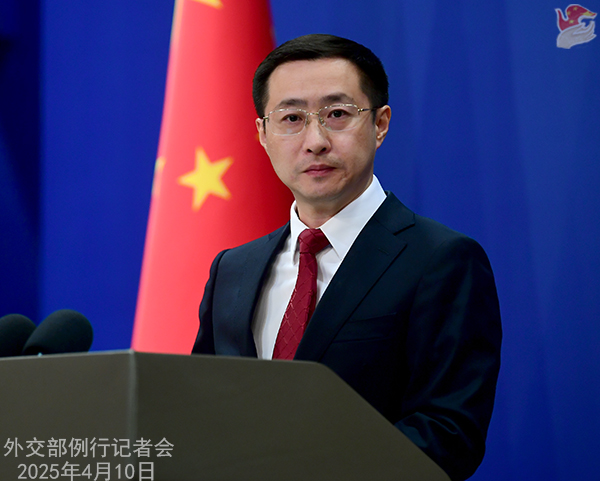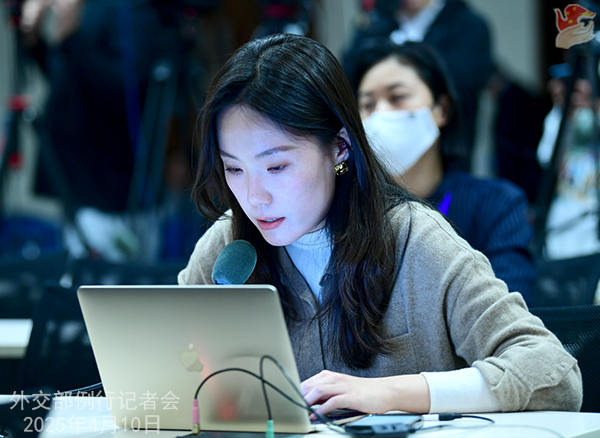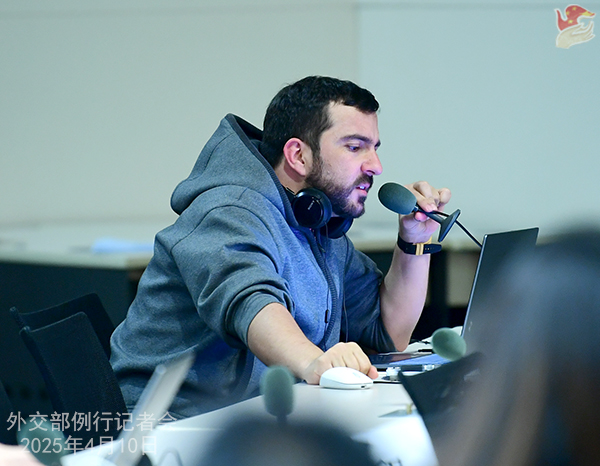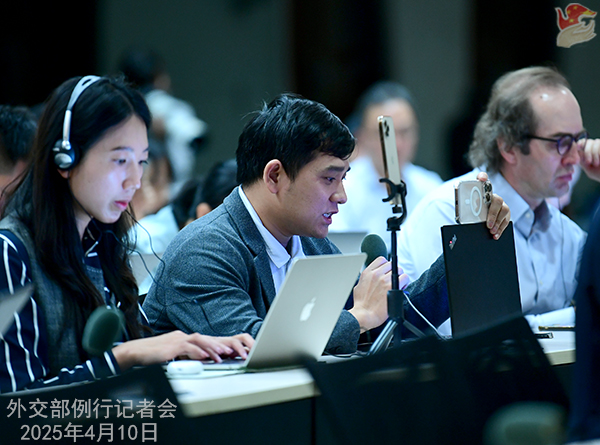
CCTV: Recently, President Xi Jinping sent a message of congratulations to the ninth Summit of the Community of Latin American and Caribbean States (CELAC), noting that China-Latin America relations have entered a new stage that features equality, mutual benefit, innovation, openness, and benefits for the people. He also welcomed CELAC member states to attend the fourth Ministerial Meeting of the China-CELAC Forum in Beijing. Could you share more information with us?
Lin Jian: Latin America and the Caribbean is an important part of the Global South and active participant in and contributor to global governance. CELAC is an important platform for regional countries to strengthen solidarity and coordination in addressing global challenges. In July 2014, President Xi Jinping and leaders of LAC countries jointly announced the establishment of the China-CELAC Forum. The inaugural ministerial meeting of the forum was successfully held in Beijing in January 2015, marking the official launch of the forum. Over the past decade, the forum has flourished with increasingly mature mechanisms and has become an important platform for enhancing political mutual trust, aligning development strategies, and promoting people-to-people connectivity between China and LAC countries. It has played a positive role in bringing the China-Latin America relations into this new stage that features equality, mutual benefit, innovation, openness, and benefits for the people.
As changes of the world, of history, and of the times unfold at an unprecedented pace and uncertainties, instabilities and unpredictability in the world are notably increasing, the fourth ministerial meeting of the forum will enable the two sides to discuss development strategies, jointly address challenges, amplify the Global South’s collective voice for solidarity and self-reliance, and provide stability and positive energy for a world of turbulence. China and LAC countries are actively advancing preparations for the meeting, and relevant information will be released in a timely manner. Please stay tuned.
AFP: President Donald Trump has paused tariffs now on most countries but has raised duties on China to 125 percent. He also said China has shown a lack of respect and what is China’s response to this treatment? And will China announce further rises in its own tariffs on U.S. imports?
Lin Jian: The U.S. uses tariff as a weapon to exert maximum pressure for its own selfish gains, which severely hurts the legitimate rights and interests of all countries, violates the WTO rules, sabotages the rules-based multilateral trading regime, and destabilizes the global economic order. The U.S., in defiance of global criticism, is pitching itself against the rest of the world. China has taken necessary countermeasures against the U.S.’s bullying acts in order to safeguard its own sovereignty, security and development interests, and more importantly, to uphold international fairness and justice and the multilateral trading regime, and protect the common interests of the international community. A just cause enjoys the support of many. America’s move that goes against the trend of the times will find no support and end up in failure.
Let me stress once again that tariff and trade wars have no winner. China does not want to fight these wars but is not scared of them. We will not sit idly by when the Chinese people’s legitimate rights and interests are denied or when the international trade rules and the multilateral trading regime are undermined. If the U.S. is determined to fight a tariff and trade war, China’s response will continue to the end. If the U.S. puts its own interests over the public good of the international community and sacrifices all countries’ legitimate interests for its own hegemony, it will for sure meet stronger opposition from the international community.
AFP: President Volodymyr Zelenskyy has said that Ukraine knows the personal details of 155 Chinese nationals who are fighting for Russia in its invasion of Ukraine. China yesterday denied that large numbers of citizens have been recruited by the Russian army. Does China therefore think that President Zelenskyy is somehow lying or mistaken?
Lin Jian: Let me reaffirm that China did not start the Ukraine crisis, nor is China a party to it. We firmly support and actively strive for peaceful settlement of the crisis. The Chinese government always asks Chinese nationals to stay away from areas of armed conflict, avoid any form of involvement in armed conflict, and in particular avoid participation in any party’s military operations. We call on the relevant party to be right and sober about China’s role rather than make irresponsible remarks.
Anadolu Agency: About the tariff issue, U.S. President Donald Trump said China wants to have a deal but they don’t know how quite to go about it. What do you think that means? And are there any contacts between the U.S. and China on the issue? (A similar question was asked by Reuters.)
Lin Jian: The U.S. is still abusing tariffs on China. China firmly rejects and will never accept such hegemonic and bullying move. Intimidation, threat and blackmail are not the right way to engage with China. If the U.S. truly wants to talk, it should let people see that they’re ready to treat others with equality, respect and mutual benefit. If the U.S. decides not to care about the interests of the U.S. itself, China and the rest of the world, and is determined to fight a tariff and trade war, China’s response will continue to the end.

The Paper: Since the outbreak of the earthquake in Myanmar on March 28, China has made an all-out effort to assist in Myanmar’s rescue and relief work, which is well received by the people in Myanmar and the international community. Could you share more details on China’s assistance and next steps?
Lin Jian: Since the outbreak of the earthquake, Chinese rescue forces have rallied around and saved lives against time. China was the first country that announced emergency assistance to Myanmar, sent rescue forces to the country, and set up settlement centers in the affected areas. The Chinese rescue team found the first trapped survivor. More than 30 rescue teams of over 600 members rushed to Myanmar for rescue work and we offered several batches of supplies, which demonstrates China’s speed, contribution and kindness. This is warmly welcomed and appreciated by the people in Myanmar.
Myanmar’s disaster response work has moved to epidemic prevention and control, as well as recovery and reconstruction. As a friendly neighbor and “pauk-phaw” brother, China has decided to send another batch of emergency humanitarian supplies, which include the most needed refined oil, prefabricated houses, operating rooms, medicines, and vaccines. China will also dispatch medical and epidemic prevention experts for treatment and disinfection, as well as experts to examine, assess, reinforce, and repair affected buildings and cultural relics.
A merciless disaster brings the best out of humanity. China will continue to promote the China-Myanmar “pauk-phaw” friendship, uphold the spirit of the China-Myanmar community with a shared future, help the people in Myanmar overcome difficulties and rebuild their homes.
EFE: What’s China’s response to U.S. Treasury Secretary Scott Bessent saying that Spain getting closer to China is like “cutting your own throat”?
Lin Jian: Speaking of “cutting the throat,” the U.S. threat and blackmail against the rest of the world with tariffs is a real attempt to choke the throat of other countries and bully them into making a compromise or concessions.
The relationship between China and Spain is a vital component of the relations between China and the EU. Last year, the total trade between China and Spain topped US$50 billion and Spain’s exports to China grew by 4.3 percent. In recent years the bilateral cooperation on the new energy industry has boosted green and low-carbon development. The two countries maintain communication in the multilateral cooperation and jointly uphold the international system with the UN at its core and the WTO-centered multilateral trading system. Just like the friendly ties between China and other countries, the cooperation between China and Spain always serves as a driving force for both countries’ economic growth delivers tangibly for the two peoples, and contributes to world stability and development.

AFP: I’d like to return to President Zelenskyy’s comments from yesterday and he was very specific when he was talking about the number, the Chinese nationals allegedly fighting for Russia, 155 Chinese nationals. I’m wondering if that number had been raised privately with Chinese diplomats. Is China in the process of verifying the actual number of its citizens that are allegedly fighting as mercenaries for Russia in its invasion of Ukraine? And President Zelenskyy also said that the actions of these citizens in Russia show that Moscow is attempting to drag China into the Ukraine war. What’s China’s response to that?
Lin Jian: Regarding your question, I have nothing to offer. Let me stress that, on the Ukraine issue, China holds an objective and just position and always calls for deescalation and ceasefire while promoting peace talks, as the world can see. The relevant party needs to be right and sober about China’s role and refrain from making irresponsible remarks.
AFP: China has reminded its nationals to make a full assessment of the risks before traveling to the United States. Can you elaborate or provide any details about the potential threats that Chinese nationals may face there, which have prompted this guidance?
Lin Jian: The situation you mentioned is caused by the U.S.’s hegemonic and bullying acts of exerting maximum pressure. These actions have weakened the social and public foundations of China-U.S. relations and have hindered exchanges and cooperation between the two countries in multiple fields. China will continue to take strong measures to safeguard its own legitimate rights and interests.
Reuters: Trump has signed an executive order that levies U.S. port docking fees on any ships whose fleet has Chinese-built or Chinese-flagged vessels and that’s aimed at reducing Chinese dominance of the global shipping industry. Do you have any comment on that?
Lin Jian: The development of China’s shipbuilding industry is a result of companies’ tech innovation and active participation in market competition, which greatly contributes to global trade and the stable and secure operation of the global industrial and supply chains. Various U.S. studies show that the U.S. shipbuilding industry lost its competitive advantage many years ago due to over-protection. Blaming the U.S.’s own industrial woes on China lacks factual basis and economic common sense. America’s domineering practice of unilateralism and protectionism will find no support but only push up global maritime shipping costs, destabilize global industrial and supply chains, harm the interests of all countries, and ultimately fail to revitalize the U.S. shipbuilding industry.
The Voice of Viet Nam: As far as I know, Chinese leader will start his visit to Viet Nam, Malaysia and Cambodia next week. Against the backdrop of a complex and volatile international landscape, is there any special objective for this visit? Will any cooperation agreements be signed in Viet Nam?
Lin Jian: China and Southeast Asian countries, including Viet Nam, are good neighbors connected by mountains and rivers and sharing close cultural bond. We are also good partners with intertwined interests and a shared future. Regarding the specific visit you asked about, I have no information to share at the moment. Please stay tuned.
